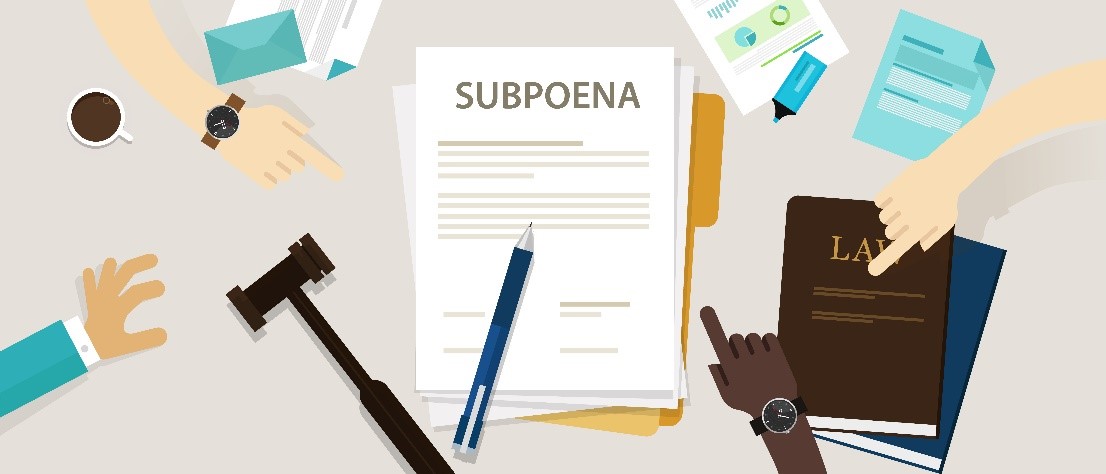
Subpoenas – what are they, what is the point, and what is involved in the process?
This post aims to answer these questions and explain what a subpoena really is.
What is a Subpoena?
Where a person or an organisation holds a document that is relevant to a Court proceeding, or where a person possesses relevant evidence/knowledge, that person/organisation can be compelled to provide the document to the Court and/or give evidence at a Court hearing through a subpoena.
A subpoena is a legal document issued by the Court that compels a person to:
– produce documents to the Court; and/or
– give evidence at a Court Hearing.
Subpoenas are used when a person either refuses, or is unable on their own free will, to provide certain documents or give evidence before the Court.
The Application Process
There is a specific Court form that is used to request a subpoena.
This form should:
– state the name of the person the subpoena is directed to;
– for a subpoena to produce documents – set out exactly what documents are required to be produced; and
– for a subpoena to give evidence – state the date, time and place for when the person is required to give evidence.
Once complete, this form is then filed with the Court and served on the person subpoenaed, all parties to the proceedings and any other person who may reasonably have an interest in the subpoena.
A party to a Court proceeding cannot request more than 5 subpoenas without the approval of the Court.
Cost
When requesting a subpoena, the person or organisation that is subpoenaed must be given “conduct money”. Conduct money is cash to cover the cost for the person/organisation to copy whatever documents are requested and/or travel to and from their place of residence/employment to the Court.
There is also a $55 Court filing fee to request a subpoena.
Service
There are specific timeframes that must be met when serving the subpoena.
Service of subpoena requiring a person to attend and give evidence
For a subpoena requiring a person to attend at Court and give evidence, the subpoena must be served at least 7 days before attendance is required.
The subpoena must personally be served on the person subpoenaed (i.e. provided directly to them by hand).
Service of subpoenas requiring a person to produce a document
For a subpoena requiring the production of a document, it must be served at least 10 days before the date for production.
This subpoena can be served by ordinary service (i.e. by post, email, fax).
Service on all parties and interested persons
The subpoena must also be served on all parties to the proceedings and any other person who may reasonably have an interest in the subpoena. This can be done by ordinary service. Where the subpoena is for the production of a document, it should be served on these persons at least 10 days before the date for production.
Objections
The person subpoenaed may object to giving evidence or producing the documents and so can a party to the proceedings.
Reasons for objection ordinarily include:
– Privilege – for example, legal professional privilege
– Relevance to proceedings – a subpoena cannot be used as a fishing exercise
– Abuse of process – subpoenas should not be used as an alternative to the discovery / disclosure process
– Oppressiveness – for example, an unreasonable burden on the person subpoenaed
An objection can be made using the Notice of Objection on the last page of the subpoena.
The cost to object to a subpoena can be quite significant as a hearing will be required, and the Judge or Registrar will need to determine the objection.
If a person is successful in their objection, then the subpoena will not be allowed to proceed, and parties will not be able to inspect documents and/or the person subpoenaed will not be required to attend Court and give evidence.
If no objection is made or the objection is not successful, then the parties can inspect the documents and/or the person subpoenaed will be required to attend Court and give evidence.
Inspection of Subpoenaed Documents
Each party to the proceeding (or their lawyer) or interested person may request to inspect the subpoena. Once the request has been made, the party (or their lawyer) or interested person should contact the Registry and make an appointment to inspect the documents.
Copies of the documents can be made unless they are child welfare records, criminal records, medical records or police records.
If a person’s medical records have been subpoenaed, that person can request to first inspect the documents before deciding if they want to object to their inspection by another party or interested person.
Would you like further information?
If you want to discuss the subpoena process further, please contact us today or book an appointment online.
Disclaimer:
The information contained on this site is for general guidance only. No person should act or refrain from acting on the basis of such information. You should seek appropriate professional advice based on your particular circumstances.


